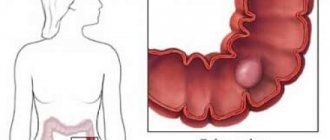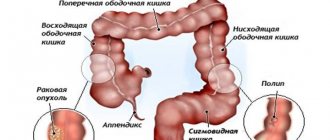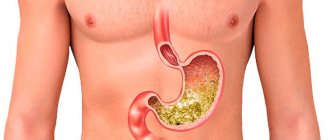Poor diet is a common cause of halitosis
Sometimes parents associate the occurrence of bad breath with the fact that the baby may have eaten something too odorous or stale.
Indeed, some foods can leave a not entirely pleasant smell for a long time - garlic, radishes or radishes, onions, cabbage, corn. Drinking certain juices and carbonated drinks also contributes to this. But the smell should not be very persistent - ventilation of the organs and natural cleansing of the oral cavity should quickly cope with it.
Often such a sign can occur after an excessive feast, when the baby at the festive table simply ate too much. The digestive system, in its normal mode, cannot process excess food, so it stagnates in the stomach - this is where unpleasant belching with a putrid unpleasant odor occurs. This also happens in children who are prone to overeating and obesity - for them this symptom can often be chronic. If the diet shifts towards protein foods, this stimulates constant rotting processes.
Correct introduction of the first complementary foods during breastfeeding will help avoid the appearance of excess weight in children. Very often this problem occurs among sweet lovers. Waste products released by colonies of microorganisms can cause an unpleasant odor.
The key to fresh breath is hygiene
It is imperative to pay attention to the condition of the oral cavity. Maybe the child is too lazy to brush his teeth, or he does it just for show, without thoroughly cleaning the gums and interdental space. Therefore, in this case, it is possible that the baby has developed and is developing caries, and the appearance of the smell is connected precisely with this.
You need to take care of your oral cavity as soon as your baby gets his first teeth. Colonies of pathogenic microorganisms develop well in a poorly cleaned oral cavity.
Take a good look at the condition of the oral mucosa - mothers are sometimes able to detect signs of stomatitis or other inflammations.
There can be a lot of food debris left on the mucous membrane of the tongue and parents should not forget about this. Very young children need to regularly clean their tongues of plaque; as they grow older, you need to teach them to do this on their own.
Types of regurgitation in newborns
There are 3 types of regurgitation:
- belching - the release of air captured by the baby when eating, as a rule, a small volume of milk or formula comes out;
- regurgitation - the food received and the air along with it come out very abundantly. In time, this occurs simultaneously with the end of the meal or after a short period of time. Children in the first 5 months of life are more often susceptible to this phenomenon. Does not cause anxiety or crying in the child, appetite does not disappear;
- vomiting is similar to regurgitation, but there are a number of features. The child is capricious, cries, becomes sleepy, lethargic. There is a complete loss of appetite and reluctance to eat.
If there is insufficient salivation, consult a doctor
In some cases, bad breath may be associated with the use of certain medications.
The oral cavity in children should not be dry. Due to its composition, saliva is destructive for microorganisms; it takes part in the self-cleaning of the oral cavity, simply washing away all food debris.
In case of insufficient salivation, parents should definitely consult a doctor for advice. Perhaps this condition was caused by taking certain medications. The periods after illnesses during which the baby took antibiotics for a long time are very dangerous.
Be sure to check the normal secretion of the salivary glands.
Causes of cholitosis in children
Halitosis can develop in children of different ages and for various reasons: from poor oral and dental hygiene or the presence of a foreign object in the baby’s nostril. A doctor who examines a child can determine several causes of cholithosis:
- an incorrectly chosen diet, from which it is necessary to exclude fatty, fried foods flavored with garlic and onions;
- the stressful situation experienced by the baby causes dryness in the baby's cavity, and can cause cholithosis. In case of stress, the child should be given acidified water to drink or the child should be given a slice of tangerine so that he can suck on it;
- unpleasant smell in the morning. Bad breath after sleep is caused by the fact that a sleeping child does not produce saliva, which is a favorable environment for the growth of bacteria. After the morning hygienic brushing of teeth, the smell disappears.
Bad breath can cause respiratory diseases
If there is no visible pathology in the oral cavity, visiting a pediatric dentist can also add clarity to the fact that the cause of the unpleasant odor may be respiratory diseases. And if there are no other symptoms, you should definitely go to the pediatrician.
Tonsillitis
Acute or chronic forms of tonsillitis (inflammation of the tonsils) contribute to the accumulation of pathogenic microorganisms and their reproduction, the formation of mucus and suppuration. Very often this condition is accompanied by bad breath.
The structure of the tonsils themselves is cavernous; small decomposing particles of food sometimes accumulate in their cavities.
Regular gargling should be included in the list of mandatory hygiene procedures.
Bronchitis
With bronchitis (inflammation of the respiratory tract) of various etiologies or pneumonia, often bad breath can be one of the manifestations of these diseases.
A lot of sputum accumulates in the bronchioles and bronchi, which comes out when coughing, and it is accompanied by an unpleasant odor.
Adenoids and rhinitis
One of the causes of bad breath is accumulated phlegm.
With rhinitis (runny nose) of an allergic or infectious nature, purulent masses always form abundantly, and discharge flows down the back wall of the nasopharynx. This mucus decomposes under the influence of bacteria, resulting in the release of volatile sulfur compounds with a very unpleasant odor.
When the adenoids are inflamed or overgrown, when they block the posterior nasal passages (most of their lumen), as well as a runny nose, the baby breathes through the mouth, which causes the oral cavity to dry out. This contributes to the massive proliferation of colonies of microorganisms and various unpleasant symptoms.
Why do adenoids enlarge in a child?
For small children, be sure to make sure that he does not put anything in his nostril. The baby could even forget about it and the foreign body does not bother him in any way, but this will result in irritation of the mucous membrane, secretion of mucus with an unpleasant odor and difficulty in nasal breathing.
Diagnosis and treatment
To diagnose ENT diseases, an otolaryngologist uses hardware and laboratory tests. These include:
- rhinoscopy – to examine the nasal cavity;
- radiography and computed tomography - to assess the condition of the sinuses;
- examination of nasal secretions to determine the causative agent of inflammation;
- Blood and urine tests will complement the clinical picture.
In the process of collecting anamnesis, the doctor is interested in the following questions:
- How long has the child been complaining of discomfort?
- What time of day does the smell appear and how long does it last?
- What foods did the child eat?
- how much water does he drink?
- Does the smell go away after brushing your teeth?
- What chronic diseases does he have?
- what medications does he take?
Treatment does not imply the elimination of the symptom itself, as such, but the therapy of the specific disease that provoked its appearance. If, as a result of examination and diagnostic measures, pathologies of the nose or nasopharynx were identified, the doctor will prescribe adequate drug treatment, which may include:
- antibacterial therapy (taking antibiotics);
- vasoconstrictors and antihistamines;
- special medical procedures;
- physiotherapy: inhalations, UV and UHF therapy;
If necessary, the otolaryngologist can refer a small patient to specialized specialists if the solution to this problem falls within their competence (dentist, gastroenterologist, etc.).
Digestive problems
Often true halitosis occurs as a consequence of serious dysfunctions of the gastrointestinal tract, as well as metabolic disorders. If you can rule out causes that are related to the respiratory system, be sure to undergo a complete examination of the digestive organs.
If a child has a sour smell from his mouth, this may indicate problems with the upper intestines and stomach. This often happens in the chronic course of gastroesophageal reflux, when a certain amount of undigested food soaked in gastric juice is thrown into the esophagus. This causes an unpleasant belching with a characteristic odor.
Also, such a symptom sometimes indicates developing gastritis, duodenitis, and even the beginning of an ulcerative process. Helicobacter infection cannot be ruled out, since the duodenum and stomach are the ideal place in which its colonies develop.
A bad odor can also occur when digested food masses stagnate in the intestines due to the accumulation of helminths (worms) in it.
An unpleasant odor often occurs due to intestinal dysbiosis - a pathological condition that accompanies increased gas formation, bloating, and frequent diarrhea. In some cases, such a disorder may be almost asymptomatic, with the exception of bad breath.
If there is a pronounced smell of raw liver in a child, one can immediately suspect the presence of hepatitis or liver failure. Also, if this organ is damaged, a rotten egg (hydrogen sulfide) smell may occur.
An alarming symptom is the smell of ammonia from the mouth of children. In this case, it is imperative to check the condition of the urinary system and in particular the kidneys.
List of diseases that can be detected
Despite the fact that halitosis is not a disease, it is an important diagnostic symptom by which a specialist can assume the presence of a certain disease in the body. Suspected health problems may include:
- diseases of the nose and nasopharynx: sinusitis, pharyngitis, tonsillitis, adenoiditis;
- food allergies or respiratory rhinitis causing nasal congestion;
- dental diseases of teeth and gums;
- Gastrointestinal diseases: gastritis, increased stomach acidity, intestinal dysbiosis, etc.;
- endocrine disorders: diabetes, thyrotoxicosis, etc.
As can be seen from this impressive list of diseases, solving breathing problems can fall within the competence of a variety of highly specialized specialists: otolaryngologist, dentist, gastroenterologist, endocrinologist.
A dangerous symptom is the smell of acetone from the mouth
If you smell acetone in your child’s breath, be sure to consult a doctor; this indicates serious problems with the metabolism and endocrine system. Sometimes such a symptom may indicate that the baby is beginning to develop diabetes.
If a laboratory blood test shows the sugar level is within normal limits, then a condition such as an acetonemic crisis with a characteristic odor and vomiting can occur as a result of overwork, poisoning, and in some cases even due to nervous stress.
Be sure to check the functioning of the thyroid gland - if the normal production of thyroid hormones, which are directly responsible for metabolic processes, is disrupted, the concentration of acetone in the blood may increase, and this is accompanied by a characteristic odor.
How to distinguish a normal smell from a problematic one?
If an unpleasant symptom occurs exclusively in the morning and goes away after brushing your teeth, then we are talking about a physiological norm. If bad breath is observed after hygiene procedures and becomes protracted, then this deviation requires the closest attention from parents.
In addition, it is worth noting that the above risk factors can be eliminated. However, if hygiene is maintained, respiratory infections and specific foods are excluded, and the unpleasant symptom persists for a long time, this is a good reason to consult a doctor.
In this case, altered breathing can signal very specific diseases. Let's look at which ones further...
Psycho-emotional state disorder
Sometimes halitosis can occur in children after severe excitement.
In some cases, the cause of halitosis may be hidden in the environment that surrounds the child. The fragile psyche reacts too painfully and sensitively to stressful situations, which can be almost invisible to adults, but for a child they are a serious test.
When the nervous system is overexcited, dry mouth, acetonemic crises with all their consequences mentioned above, and digestive disorders are possible.
You need to talk to your child to try to find out the root cause of worries and fears. Maybe he has problems in the children's team (conflicts in the yard, at school or kindergarten). Older children also have more serious problems. Sometimes this syndrome can occur due to failures in studies or during exams.
Children often have problems with their home environment - they experience constant fear of possible punishment for various little things - unassembled toys, something dropped on the floor, etc. He may be afraid to once again disturb adults with a question that worries him, as he may receive an irritated answer.
Such a nervous state often results in various disturbances in the functioning of the child’s body, which can result in bad breath.
If your baby is very worried, give him a slightly acidified drink and calm him down by any available means. Once the environment is normalized and stress is relieved, halitosis should disappear.
Prevention
Teach your baby to practice good hygiene from an early age. Do not forget about regular visits to the dentist, it is better if they are joint.
In childhood, the diet should not contain unnecessary excesses; it must be correct. It is better if you ask a nutritionist all questions related to this.
Be sure to create and maintain a favorable psychological environment; you will assist your child in solving his problems, even if in your opinion they seem ridiculous.
If bad breath occurs for no apparent reason, do not wait for anything, but consult a doctor immediately. Maybe he can just dispel all parental fears and give the necessary advice.
Preventive measures
To promptly prevent the appearance of halitosis in your baby, you must follow a few simple rules:
- Brush your baby's teeth thoroughly twice a day, starting when the first tooth emerges. It is necessary to teach your child how to use a brush and toothpaste correctly to remove plaque from the surface of the teeth.
- Adhere to the age-specific nutrition system, introduce vegetables, fruits, and foods rich in phosphorus and calcium into your child’s diet.
- Eliminate sugar, chocolate, and other sweets from your diet and replace them with honey.
- Give your child plenty of fluids, especially drinking water.
- Visit your dentist regularly to prevent the development of caries.
»










